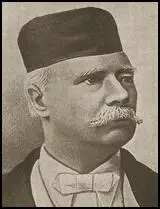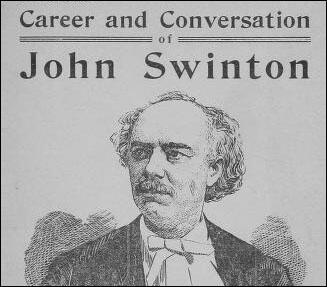John Swinton

John Swinton was born in Saltoun, Scotland, on 12th December, 1830. His family emigrated to Canada in 1843. Later they moved to Illinois. After leaving school he worked as a printer before finding employment on a steamboat on the Mississippi.
Swinton developed an abhorrence for slavery while living in Charleston, South Carolina. He moved to New York City in 1857 where he began the studying medicine. Swinton also worked as a freelance journalist and in 1860 he was appointed as head of the editorial staff of the New York Times by Henry J. Raymond. Swinton held liberal views and was a strong supporter of Abraham Lincoln and wrote extensively about the American Civil War. Swinton left the newspaper in 1870.
Swinton took a keen interest in the growing trade union movement and according to one source, over the next few years he "was busy as an orator and writer, championing the cause of the poor and oppressed". In 1874 he was selected by the Industrial Political Party to be the candidate for Mayor of New York City. Swinton received very few votes but he later claimed that it was part of a propaganda campaign rather than a serious attempt to win power.
In 1875 Swinton found work with the New York Sun. He continued to campaign for the rights of organized labour and in 1877 gave his support to the Brotherhood of Locomotive Fireman in their fight for better pay and conditions.

In 1880 Swinton was invited to speak at a meeting of journalists in New York City about the freedom of the press. He outraged his colleagues by arguing: "There is no such thing, at this stage of the world’s history in America, as an independent press. You know it and I know it. There is not one of you who dare write your honest opinions, and if you did, you know beforehand that it would never appear in print. I am paid weekly for keeping my honest opinions out of the paper I am connected with. Others of you are paid similar salaries for similar things, and any of you who would be foolish as to write honest opinions would be out on the streets looking for another job. If I allowed my honest opinions to appear in one issue of my papers, before twenty-four hours my occupation would be gone. The business of the journalist is to destroy the truth, to lie outright, to pervert, to vilify, to fawn at the feet of mammon, and to sell his country and his race for his daily bread. You know it and I know it, and what folly is this toasting an independent press? We are the jumping jacks, they pull the strings and we dance. Our talents, our possibilities and our lives are all the property of other men. We are intellectual prostitutes."
In 1883 Swinton established his own newspaper, John Swinton's Paper. However, sales were poor and according to the New York Times: "This he conducted for four years hard struggle. It has given him an opportunity to spread his ideas on social and industrial questions. He had been on the side of the masses, but his paper died for want of support by them."
During the municipal campaign of 1887 he was the candidate of the Progressive Labor Party for Senator from the Seventh District. Although he was defeated he "polled a very heavy vote."
Swinton was a great supporter of Eugene Debs. In 1894 Swinton argued that as an orator, Debs was comparable to Abraham Lincoln: "It seemed to me that both men were imbued with the same spirit. Both seemed to me as men of judgment, reason, earnestness and power. Both seemed to me as men of free, high, genuine and generous manhood. I took to Lincoln in my early life, as I took to Debs a third of a century later."
In 1883 Swinton established his own newspaper, John Swinton's Paper. However, sales were poor and according to the New York Times: "This he conducted for four years hard struggle. It has given him an opportunity to spread his ideas on social and industrial questions. He had been on the side of the masses, but his paper died for want of support by them."
Swinton was the author of several pamphlets including New Issue: the Chinese American Question (1870), Eulogy on Henry J. Raymond (1870), John Swinton's Travels (1880) and an Oration on John Brown (1881).
John Swinton died on 15th December, 1901. In his obituary, the New York Times claimed: "He was never afraid to speak what he believed boldly and unreservedly... It was his boast that he never, no matter what the ideas of his employers were, wrote a line contrary to his honest convictions as uttered on the stump... As a man of original ideas and of freedom from the trammels of conventionality, Swinton had many admirers, even among those whose convictions were wholly opposed to his own."
Primary Sources
(1) John Swinton, speech in New York City (1880)
There is no such thing, at this stage of the world’s history in America, as an independent press. You know it and I know it. There is not one of you who dare write your honest opinions, and if you did, you know beforehand that it would never appear in print. I am paid weekly for keeping my honest opinions out of the paper I am connected with. Others of you are paid similar salaries for similar things, and any of you who would be foolish as to write honest opinions would be out on the streets looking for another job. If I allowed my honest opinions to appear in one issue of my papers, before twenty-four hours my occupation would be gone. The business of the journalist is to destroy the truth, to lie outright, to pervert, to vilify, to fawn at the feet of mammon, and to sell his country and his race for his daily bread. You know it and I know it, and what folly is this toasting an independent press? We are the jumping jacks, they pull the strings and we dance. Our talents, our possibilities and our lives are all the property of other men. We are intellectual prostitutes.
(2) The New York Times (16th December, 1901)
He was never afraid to speak what he believed boldly and unreservedly... It was his boast that he never, no matter what the ideas of his employers were, wrote a line contrary to his honest convictions as uttered on the stump... As a man of original ideas and of freedom from the trammels of conventionality, Swinton had many admirers, even among those whose convictions were wholly opposed to his own.

